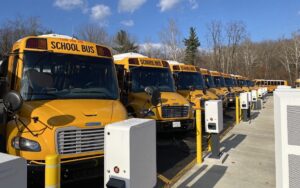The buses, funded through a joint partnership between Infrastructure Canada and Highland Electric Fleets, will lower the Alberta school district’s carbon footprint and improve air quality for students

Five new electric school buses are coming to St. Albert, Alta., thanks to a $2.9 million joint funding between the federal government and Highland Electric Fleets, a Massachusetts-based electric school bus provider. Photo: Highland
The buses, funded through a joint partnership between Infrastructure Canada and Highland Electric Fleets, will lower the Alberta school district’s carbon footprint and improve air quality for students
Five new electric school buses are coming to St. Albert, Alta., in a $2.9-million deal between the federal government and Highland Electric Fleets.
St. Albert joins Parkland County, near Edmonton, as the only city and municipal district in Alberta deploying electric school buses.
Roughly $1.34 million of the project’s financing will come from Infrastructure Canada’s Zero Emissions Transit Fund (ZETF). Notably, this is the first time the ZETF fund is being used to purchase electric school buses and related charging infrastructure.
Highland, a Massachusetts-based electric school bus provider, will foot the remaining $1.6 million through financing and direct payment.
“Investments in green transit options help create meaningful change in communities across the country, including right here in Alberta,” said Randy Boissonnault, minister of Tourism and associate minister of finance and member of parliament for Edmonton Centre in a press statement.
“These new electric buses will help bring students to school and back while reducing greenhouse gas emissions and supporting our efforts to achieve net-zero emissions by 2050.”
Infrastructure support
Highland will work closely with Cunningham Transport, a local school bus provider, to deploy and provide maintenance to the e-buses. They will also provide training for the school bus drivers and warranties for the bus parts.
“There’s a component of really just being a partner [to Cunningham] to ensure reliability and remove some of the risks of unexpected costs, unknown services that might be needed,” says Duncan McIntyre, CEO, of Highland Electric Fleets in an interview with Electric Autonomy.
At the Cunningham Transport yard, a combination of Level 2 and DC fast-charging stations will be installed to power the buses by Highland.
“Level two chargers are great when you have routes that can rely on an overnight charge,” says McIntyre. Highland will be also adding DC fast chargers to support mid-day charging during colder months and for buses with longer routes.
The manufacturers of the electric school buses will be chosen in the coming weeks, says McIntyre. The five zero-emission buses are expected to be put on roads by January 2024.
Benefits of electric school buses
The e-buses will be a significant step in reducing St. Albert Public School Division’s carbon footprint. As well they will improve air quality in and around schools and the community, says Paula Power, manager of communications services at St. Albert Public Schools in an email to Electric Autonomy. Additionally, electric buses offer a quieter and smoother ride for students.
“We are committed to looking for ways to keep our community healthy and strong, and to help protect the environment,” says Power. “We hope to drastically reduce emissions with these buses. We also hope to set an example for our students, who will see our commitment to the environment in action.”
The e-buses will serve 15 out of 18 of the schools within the St. Albert Public School Division. Each bus follows a route that enables it to drop off students at three to four different schools, per outing.
The St. Albert school board will test how the e-buses perform in the fleet until 2028, says Power.
“We are eager to see how they operate in our climate. We are hopeful that…we can increase our usage of these kinds of environmental technologies in the future,” she says.
The St. Albert Public School Division currently operates 38 diesel buses in its fleet.
Atlantic Canada next in line
St. Albert is not the only school board in Canada looking to switch from diesel to electric school buses. The momentum toward scaling accessible electric school transportation is ramping up in Atlantic Canada too.
This month, Nova Scotia issued a Request For Proposal (RFP) tender for a feasibility study to electrify public school bus fleets in Nova Scotia, New Brunswick and Newfoundland and Labrador.
The RFP was made on behalf of the Council of Atlantic Ministers of Education and Training (CAMET). CAMET is an intergovernmental body that enhances cooperation in early childhood, public and post-secondary education between the Atlantic provinces.
“The Atlantic provinces, through the coordination of CAMET, have a long-standing history of purchasing school buses jointly, resulting in significant savings for the four provincial governments,” reads the tender.
“Atlantic provinces have mainly purchased diesel, gasoline, and propane buses, but are now in a position to consider the feasibility of adopting cleaner transportation options with the purchase of electric school buses by transitioning its transportation system away from greenhouse gas emitting vehicles.”
Meanwhile, in Prince Edward Island, electric school buses have been in operation since 2021. The province currently has 82 electric school buses in its fleet. But it plans to add 125 more e-buses over the next five years, says April Gallant, senior communications officer for transportation and infrastructure in PEI in an email statement to Electric Autonomy.
The province has made a commitment to replace its full fleet of school buses with electric buses by 2030.
“I think two years ago we had initial interest from early adopters but fast forward to today, I would argue we’re into more of a mainstream level of interest from lots of schools,” says McIntyre. “It’s clear that it’s possible to electrify school buses today.”






